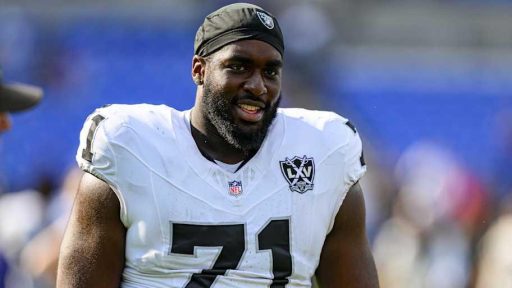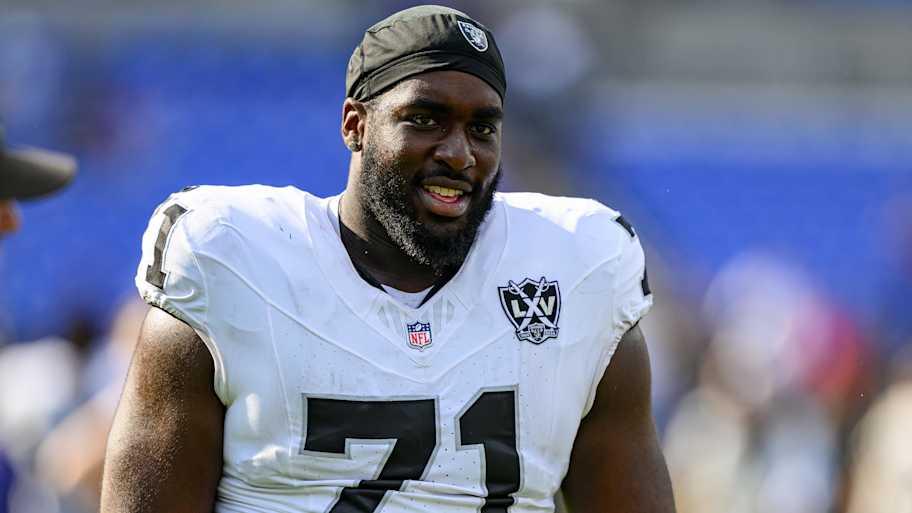Instant Access
No Waiting, Start Streaming Now
24/7 Support
Always Here to Help
Multi-Device
Watch on Any Screen
8K Quality
Crystal Clear Streaming


Instant Access
No Waiting, Start Streaming Now
24/7 Support
Always Here to Help
Multi-Device
Watch on Any Screen
8K Quality
Crystal Clear Streaming
In the unpredictable realm of the NFL, where fortunes can shift as rapidly as game-day momentum, two franchises have recently found themselves at pivotal crossroads — the Las Vegas Raiders, known for their bold moves, adn the Seattle Seahawks, a team navigating the aftermath of a season fraught with uncertainty. As the dust settles from their respective off-season decisions, the contrasting paths they have chosen raise compelling questions about ambition, loyalty, and the future of their quarterbacks. The Raiders, intrigued by the promise of a new identity, have taken an aggressive stance in pursuit of success, while the Seahawks appear to have resigned themselves to a different reality with Geno Smith. This article delves into the reasons behind these divergent strategies, exploring the motivations that drive a team to sieze the moment and the factors that compel another to pivot away from its quarterback of the present. Amidst the tension of competition and the weight of expectations, the stories unfolding in Las vegas and Seattle reveal not just the strategic choices of two teams, but a broader narrative about the ever-evolving landscape of professional football.
The Raiders left no stone unturned when crafting a defensive game plan that fully exploited Smith’s vulnerabilities. Their approach was calculated and bold, exposing cracks in Geno Smith’s decision-making under pressure. By stacking the box and disguising coverage schemes, the Raiders were able to force Smith into hurried throws and visible hesitation. The defensive front applied continuous pressure, daring him to make fast, high-risk decisions. This constant harassment played into one of SmithS well-documented weaknesses: his tendency to hold onto the ball too long when under duress, increasing sack opportunities for the opposition.
The strategic aggression was amplified by targeting specific patterns in Smith’s gameplay inefficiencies. Key areas included:
This targeted breakdown of Smith’s weaknesses resulted in a crushing defensive showing.The Raiders’ adaptability was also evident, as they regularly switched between man-to-man and zone schemes to keep his reads second-guessing and unbalanced.
the decision to part ways with Geno Smith didn’t come lightly for the Seahawks,but it was a series of subpar performances that finally forced their hand. Once lauded for his precision and leadership, Geno struggled to maintain consistency, especially in critical games where execution mattered most. Missed reads and erratic throws became a disturbing trend, leaving the offensive unit out of sync. Instead of thriving as the stabilizing force the team desperately needed, he unintentionally became a liability. What’s worse,his numbers frequently enough didn’t reflect the full story—opportunities squandered during key red-zone drives,miscommunications with receivers,and an inability to capitalize on defensive turnovers painted a clear picture to the organization.
Seattle’s frustration wasn’t solely rooted in the scoreboard. Consider the following concerning metrics from Geno’s recent starts:
| Category | Last 5 Games | League Avg |
|---|---|---|
| Completion % | 61.2% | 69.8% |
| Red Zone TD % | 40% | 58% |
| Turnovers | 6 | 2.4 |
These numbers highlight the disconnect. Fans and analysts alike questioned the reluctance of the coaching staff to make a move sooner. While loyalty to a veteran starter is commendable, the Seahawks eventually acknowledged the stark reality: what could’ve been a thriving offense ground to a halt. Missed opportunities became too glaring to ignore, leading them to re-evaluate their quarterback situation before the window of playoff contention slammed shut.
The Raiders’ decision to dial up the aggression stemmed from a mix of strategic analysis and in-game observation. Facing Geno Smith, they identified key areas where he struggled under duress. Rapid pressure and disguised coverages were deployed to disrupt Smith’s timing and force him into off-target throws. The Raiders utilized a mix of blitz-heavy schemes and zone looks, ensuring Smith had little time to read the field.This approach minimized his ability to exploit mismatches and left the Seahawks’ offense scrambling for answers.
Additionally, the Seahawks’ predictable play-calling and lack of big-play spark made them vulnerable. The Raiders leaned into this by stacking the box to stifle any ground game momentum while daring Seattle to challenge them deep. Their gamble paid off, as Geno Smith’s short-to-intermediate passing windows were consistently shut. seattle’s stalled offense led to shorter drives, giving Vegas more possessions to assert their newfound aggression. A closer look at the raiders’ defensive focus highlights these key initiatives:
| Key Factor | Impact on Geno Smith |
|---|---|
| Blitz Pressure | Forced rushed decisions and inaccurate throws |
| Stacked Box | Limited Seahawks’ running game effectiveness |
| Disguised Coverages | Decreased Smith’s ability to find open targets |
The Seahawks’ decision-making and execution around quarterback performance in recent games highlight areas ripe for betterment.First and foremost, the offensive scheme needs greater adaptability. Defensive strategies are evolving rapidly, and staying predictable harms Seattle’s rhythm. Implementing more pre-snap motion and utilizing play-action passes could help Geno Smith – or any future quarterback – perform under duress. Additionally, leaning into short-yardage plays not only alleviates pressure but also creates better opportunities to target deep threats when defenses get lulled into complacency. Creativity in route designs,such as crossing concepts and mesh routes,could also challenge defensive coverage more effectively.
Another critical lesson is the need to invest in offensive line durability and depth. Quarterbacks can’t thrive without a solid pocket,and statistics show how critical protection is to success. Here’s a quick breakdown of protection-related impacts:
| Area | Impact on QB Performance |
|---|---|
| High Sack Rates | Drop in passing accuracy |
| Time in Pocket | Improved decision-making |
| Pressure Percentage | Increased turnovers |
By addressing these areas, the Seahawks can ensure their quarterback – whether it remains Smith or transitions to someone new – achieves their full potential. success often comes from minor but meaningful adjustments like these.
As the dust settles on the recent upheavals in the NFL, the divergent paths taken by the Las Vegas Raiders and the Seattle Seahawks present a captivating case study of strategy and ambition.The Raiders,emboldened by the pursuit of immediate success,made bold moves that signal their determination to cement a formidable presence in a competitive landscape. On the other hand, the seahawks’ decision to part ways with Geno Smith reflects a calculated retreat, a moment of introspection that acknowledges the need for new beginnings on a journey shaped by growth, uncertainty, and the desire to reclaim past glory.
the narratives of aggression and concession tell us more than just the story of two franchises; they illuminate the broader themes of risk, resilience, and the ever-changing nature of professional football.As each team navigates the season ahead, fans and analysts alike will watch closely, eager to see how these pivotal choices unfold on the field.Whether the Raiders’ boldness will lead to triumph or the Seahawks’ transition to a brighter future remains to be seen. In the NFL, as in life, every decision lays the groundwork for a new chapter, reminding us that the game is as much about strategy off the field as it is about the one played under the shining lights.
34,353
Live TV Channels
162,404
Movies
27,802
Series
284,023
Total Subscriptions
139,854
Users Online
142,887
Total Resellers

